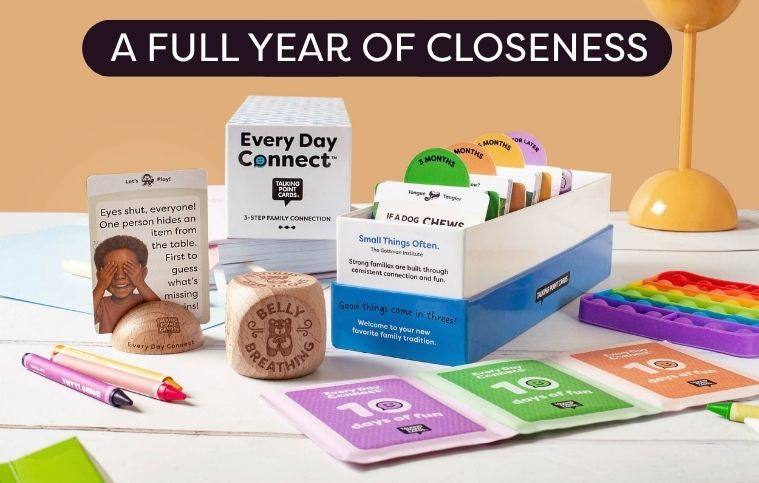SHOP
About

How to Have a Serious Conversation About your Friendship
March 05, 2024 8 min read
Regardless of what you think, friendships aren’t always sunshine and roses. Navigating the complexities of friendship sometimes means having deep, meaningful conversations that can feel daunting.
Whether it's addressing concerns, setting boundaries, or simply wishing to deepen your connection, initiating such dialogue requires sensitivity and courage. Approaching these talks with empathy, clarity, and a genuine desire for mutual understanding is crucial.
This piece is all about helping you chat about your friendship in a real, down-to-earth way. We've got some handy tips on how to pick the right moment, get the vibe just right, and share what's on your mind without causing drama. It's all about making sure you can talk things out and make your friendship even stronger, doing it all with a whole lot of kindness and honesty.
Key Takeaways
- Choose a neutral, private setting for the conversation to avoid a "home field" advantage and ensure privacy.
- Approach the conversation without blame, focusing on expressing personal feelings rather than accusing.
- Clearly explain the importance of the discussion, preparing key points in advance for clarity and calmness.
- Encourage a two-way dialogue, allowing the friend to react and propose solutions for mutual benefit.
- Use a calm tone to maintain civility and facilitate constructive discussion, avoiding defensiveness or escalation.
- Use Talking Point Cards to slowly return to normal conversations after having a few difficult ones.
Find out why we all need friends and family!
What Is It Important to Have a Serious Conversation About Your Friendship?
For the most part, friendships are usually quite enjoyable and beneficial, but as is the case in any part of life, sometimes issues do come up. The fact of the matter is that every relationship, whether it is between friends, family members, or partners, will experience issues.
Whatever the case may be, if you don't bring up these issues in a conversation with your friend, then they're never going to get addressed, and will likely just worsen as time goes on.
It may also be the case that one person has boundaries which the other person continuously crosses. In the vast majority of cases, good friends won't cross boundaries knowingly. The key word there of course is knowingly. The problem is that many people don't speak up and actually convey their boundaries. If you never tell your friends what your boundaries are, they don't know what lines to cross and which ones to stay behind.

6 Tips to Have a Serious Conversation About Your Friendship
Let's make no mistake about it: having a tough conversation with a friend is perhaps one of the most difficult things you'll ever have to do.
You don't want to offend your friend or hurt their feelings, but sometimes there are things that you just have to get off of your chest.
Here are six tips to follow to have a serious conversation about your friendship, to hopefully make it go as smoothly as humanly possible.
Choose the Right Time and Location
It's always a good idea to have a tough conversation in the right location. First, a good idea is for the location to be somewhere neutral, which means that it shouldn't be at your or your friend's house. You don't want anyone to have home field advantage so to speak, because this can make the person at home feel much more comfortable than the guest.
Apart from that, privacy is also a concern. You should be at a place where you guys won’t be overheard or interrupted. A nice, private, calm, and neutral environment is best.
What's just as important as the location is the time. You don't want to have a difficult conversation with someone when they're super busy and don't have time to pay attention.
You also don't want to have a difficult conversation when someone is having a difficult time in general or if they're busy at the end of a long day.
People need to be in the right mindset, in the right mood and have enough energy for these difficult conversations, so choose your time wisely. Speaking of time, take your time with this. You don’t need to rush into it and can always start with a bit of light small talk.
Avoid Blaming Them Directly
If you're having a tough conversation with a friend, chances are that it is because you have some kind of problem with their behavior or actions. A pretty blunt way to put an end to a conversation, and to create a long-lasting fight, is to place blame directly on them. So, let’s try to avoid doing that.
Whether or not they are directly responsible, or you feel as though they are, is irrelevant here. We need to bring up the issue in such a way so that the friend doesn't feel like they are being blamed or attacked. Rather, you want to bring the issue up in a way that allows you to convey your own feelings without blaming the other.
If you have trouble doing this, you might want to take a look at the Resilience Pack from Talking Point Cards. These are special talking cards that are designed to start conversations that can make friendships and relationships stronger and more resilient, a great way to get past issues between two close friends.
Explain Why It Was Important to Reach Out
Related to the above point, not only do you want to refrain from blaming your friend for the issue at hand, but you also want to do your best to explain why it was important to reach out in the first place. If you ask your friend to have a serious or tough conversation, it might be a bit confusing as to what exactly you want.
Therefore, it is a good idea for you to practice a little speech or talking points in your head before the conversation, so you can clearly state your issue in a calm and collected manner, while also remaining civil and refraining from blaming your friend.
If you carefully and concisely explain to your friend why you reached out to them and why this conversation is happening, chances are they'll respond in an equally as calm and civil manner. Nobody wants to have a tough conversation if they don't really know what it's about in the first place.
Allow Them to React and Explain
To have a meaningful conversation with your friend, it needs to be two-sided. No good conversation flows in only one direction. Therefore, once you air your grievances, allow your friend to react and explain in their own way and on their own time.
Don't come in with any preconceived notions of how your friend will feel. They might react positively or poorly depending on the situation at hand. Whatever the case may be, don't try to stifle their reaction or invalidate their feelings, as this will only serve to worsen the existing issue.
Discussing Solutions
Once the problem is out in the open, continuously talking about it isn't the best idea. Sure, hammering out the details and determining exactly what the problem is, who caused it, and more are all good courses of action. However, without a good solution, the whole conversation is moot.
Therefore, once grievances have been aired, it's time to start discussing solutions to the problem. Two good friends should always be able to find a solution that works for both parties, and this happens through mutual conversation.
Use a Calm and Soothing Tone
If you want to have a tough conversation, perhaps one of the worst things you could do is to use an angry tone. When you talk, always be soothing, calm, and respectful.
As soon as you start raising your voice, the other person will start feeling offended and defensive. To keep the conversation civil, try to remain as calm as humanly possible.
How to Return to Normal After a Difficult Conversation
Once a difficult conversation has taken place, there might be a bit of rift between you and your friend. Just because a difficult conversation took place doesn't mean that the friendship has to end. Instead, there are some good tips that you can follow to return to normal after a difficult conversation.
Give Them Space to Think
When people are confronted with difficult situations, they often need time to think. Above, we mentioned allowing people to react in their own way, and this also means letting them react in their own time.
You might not get a reaction right away, or the reaction that you want. It takes people time to process things, and everybody processes emotions in their own time.
Although your friend might be angry at you at first, give them some time, and chances are that they'll come around.
Don’t Let it Change Your Friendship
Although it might be easier said than done, don't let a difficult conversation change your friendship. Instead, if the conversation is held in the right way, which means that solutions to the problems have been found, then the relationship should change for the better. If grievances are aired and problems are solved, then there is no reason to continue holding a grudge.
Plan Chill and Easy Meetups Following the Conversation
Once a tough conversation has taken place, it might be a bit awkward to just keep hanging out in the same way as before. This is especially the case when it comes to talking to each other and leading a normal conversation. This is where entertainment comes into play. Movies and board games are always a good option.
However, if you're really having trouble spurring a conversation between you and your friend, taking advantage of Talking Point Cards is a great idea. These are special packs of cards that come fully loaded with a multitude of conversation-starting questions. There are different packs available, such as those for couples, family members, religious groups, and more.
Besides the Resilience Pack that we mentioned above, another great option from Talking Point Card for this specific situation is the Small Talk Pack. As the name implies, this pack is full of small talk questions, just simple things to get a conversation rolling, and nothing too deep or stressful.
Did you know that a lack of small talk can have a negative impact on relationships?
Closing Thoughts
At the end of the day, the bond that two friends share shouldn't be broken by simple problems or grievances that could otherwise be simply fixed through nothing more than a slightly difficult conversation.
Remember all the tips we discussed above, and having a tough conversation with a friend should result in a positive outcome. If things are a little awkward afterward, then the conversation starters from Talking Point Cards could be useful to get you guys back on the right track.
Frequently Asked Questions
Let's quickly answer some of your most frequently asked questions about having a difficult conversation.
How to Have a Hard Conversation?
To have a hard conversation, prepare by reflecting on your goals and feelings. Approach it with empathy, choosing a calm, private setting. Communicate openly, using "I" statements to express your perspective without blame. Listen actively, validate the other's feelings, and seek a mutual understanding or resolution. Follow up afterwards to maintain progress.
What To Do After a Tough Conversation?
After a tough conversation, take time to reflect on what was said and how you feel. Practice self-care to process emotions. Reach out to the other person to ensure mutual understanding and healing. Consider constructive actions based on the discussion to strengthen the relationship and move forward positively.
How Do You Repair a Friendship?
To repair a friendship, start with an honest conversation, expressing your feelings and listening to theirs. Apologize sincerely for any wrongs and forgive past grievances. Make efforts to rebuild trust gradually, respect boundaries, and invest time in shared interests. Consistency and patience are key to mending and strengthening the bond. Remember, it’s not a sprint, it’s a marathon.







